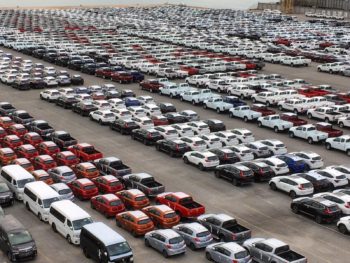UK new car market falls as tax uncertainty hits fleet demand
Tax uncertainty, including over WLTP, is continuing to impact fleet new car demand while private registrations are being hit by diesel and Brexit concerns, as shown latest new car registrations.
The figures from the Society of Motor Manufacturers and Traders (SMMT) show that total registrations fell 3.4% to 458,054 units in March despite the plate change, with the private and the sub-25 ‘Business’ segments showing falls of 2.8% and 44.8% respectively.
Fleet demand was stable, up 0.3% to 223,288 units, but failed to show the normal rises expected in a March market.
And diesel continued to tumble, with a fall of 21.4%, giving it just a 26.3% share of the market compared to 32.4% a year ago. Petrol registrations were up 5.1% to take a 68.1% share of the market (62.6% a year ago). AFVs rose 7.6% to take a 5.5% share of the market (5.0% for March 2018).
For the first three months of the year, the fleet market was down 0.9% to 353,696 units while business registrations fell 41.4% to 16,727 and private registrations were down 0.8% to 330,613. Overall, the new car market was down 2.4% for the year to date, reaching 701,036 units.
Commenting on the figures, Mike Hawes, SMMT chief executive, renewed the organisation’s calls for a no-deal Brexit to be taken off the table: “March is a key barometer for the new car market, so this fall is of clear concern. While manufacturers continue to invest in exciting models and cutting-edge tech, for the UK to reap the full benefits of these advances, we need a strong market that encourages the adoption of new technology. That means supportive policies, not least on vehicle taxation and incentives, to give buyers the confidence to invest in the new car that best meets their driving needs. Above all, we urgently need an end to the political and economic uncertainty by removing permanently the threat of a ‘no deal’ Brexit and agreeing a future relationship that avoids any additional friction that would increase costs and hence prices.”
Today’s figures come as the SMMT launches a major new report showing UK consumers could be among the first in the world to benefit from self-driving vehicles. The research positions the UK at number one, globally, for mass market potential. Provided the conditions are met, the rollout of connected and autonomous technology could prevent 47,000 serious accidents and save 3,900 lives over the next decade – with an overall £62bn economic opportunity by 2030; but this is dependent in part on the UK leaving the EU with a deal that benefits the automotive industry.
Meanwhile, Ashley Barnett, head of consultancy at Lex Autolease, said: “The new number plate release means March is usually a strong month for registrations, so although today’s fall is disappointing it’s not surprising with all of the current change in the market. Year-on-year, the market has also fallen slightly – and if we compare to this point in 2015, we are down by 4.5% on registrations four years ago with more people extending existing contracts. This suggests that confusion around future company car tax and WLTP is holding back people from ordering a replacement vehicle. The outcome of the consultation into WLTP and its impact on BiK and VED should provide some clarity when we see this in a couple of months.
“However the spotlight should be on alternatively-fuelled vehicles, and while we’re undoubtedly heading in the right direction with 40,837 registered so far this year – a year-on-year increase of 14.7% – we’re still some way behind where we need to be to reach 1m+ for the government’s 2030 Road to Zero minimum 50% target to be achievable – we need an additional 100,000 new alternatively-fuelled registrations each year to enable us to reach this.
“In an environment where there are no grants available for plug-in hybrids and reduced grants for pure electric vehicles, the upfront cost of an alternatively-fuelled vehicle is for some an ongoing barrier to entry. We would welcome a wide-reaching announcement from Government designed to increase the appeal of low and zero emission driving, including benefits for the used car buyer. This could be a scheme like our own £1m cashback fund for pure electric vehicles, working with manufacturers to ensure that the falling cost of battery technology is reflected in list prices, or financial support to encourage growth in the second-hand market.
“In Norway, almost 60% of new cars sold in March were pure electric – this demonstrates that in an environment where there is no sales tax on the purchase price and continued tax incentives, it is possible to sustain continued take-up of electric vehicle technology.”


















